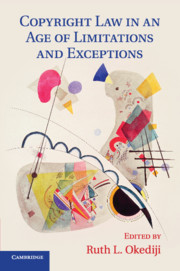Book contents
- Copyright Law in an Age of Limitations and Exceptions
- Copyright Law in an Age of Limitations and Exceptions
- Copyright page
- Dedication
- Contents
- Author Biographies
- Preface
- Introduction
- 1 Justifications for Copyright Limitations and Exceptions
- 2 The Role of the Author in Copyright*
- 3 A Few Observations about the State of Copyright Law
- 4 Fetishizing Copies
- 5 Copyright in a Digital Ecosystem
- 6 The Canadian Copyright Story
- 7 (When) Is Copyright Reform Possible?
- 8 Fair Use and Its Politics – at Home and Abroad
- 9 Flexible Copyright
- 10 The Limits of “Limitations and Exceptions” in Copyright Law
- 11 Lessons from CopyrightX
- 12 Rights on the Border: The Berne Convention and Neighbouring Rights
- 13 How Oracle Erred
- 14 Reframing International Copyright Limitations and Exceptions as Development Policy
- Index
4 - Fetishizing Copies
Published online by Cambridge University Press: 07 June 2017
- Copyright Law in an Age of Limitations and Exceptions
- Copyright Law in an Age of Limitations and Exceptions
- Copyright page
- Dedication
- Contents
- Author Biographies
- Preface
- Introduction
- 1 Justifications for Copyright Limitations and Exceptions
- 2 The Role of the Author in Copyright*
- 3 A Few Observations about the State of Copyright Law
- 4 Fetishizing Copies
- 5 Copyright in a Digital Ecosystem
- 6 The Canadian Copyright Story
- 7 (When) Is Copyright Reform Possible?
- 8 Fair Use and Its Politics – at Home and Abroad
- 9 Flexible Copyright
- 10 The Limits of “Limitations and Exceptions” in Copyright Law
- 11 Lessons from CopyrightX
- 12 Rights on the Border: The Berne Convention and Neighbouring Rights
- 13 How Oracle Erred
- 14 Reframing International Copyright Limitations and Exceptions as Development Policy
- Index
Summary
Our copyright laws encourage authors to create new works and communicate them to the public, because we hope that people will read the books, listen to the music, see the art, watch the films, run the software, and build and inhabit the buildings. That is the way that copyright promotes the Progress of Science. Recently, that not-very-controversial principle has collided with copyright owners’ conviction that they should be able to control, or at least collect royalties from, all uses of their works. A particularly ill-considered manifestation of this conviction is what I have decided to call copy-fetish. This is the idea that every appearance of any part of a work anywhere should be deemed a “copy” of it, and that every single copy needs a license or excuse. In this chapter, I focus on two well-known instances of copy-fetish: the contention that any appearance of a work or part of a work in the random access memory of a computer or other digital device is an actionable copy, and the assertion that the mere possession of a publicly accessible copy infringes the exclusive right to distribute copies to the public. Both arguments have their inception in difficult-to-justify court of appeals decisions, which were then embraced by copyright owners as tools to expand secondary liability. Neither one makes much sense on its own terms. The political economy of copyright, however, makes it overwhelmingly likely that any comprehensive copyright revision bill will incorporate both of them. That makes it imperative that we recognize readers’, listeners’, and viewers’ copyright liberties expressly, and protect them with explicit statutory provisions.
- Type
- Chapter
- Information
- Copyright Law in an Age of Limitations and Exceptions , pp. 107 - 131Publisher: Cambridge University PressPrint publication year: 2017
- 1
- Cited by



